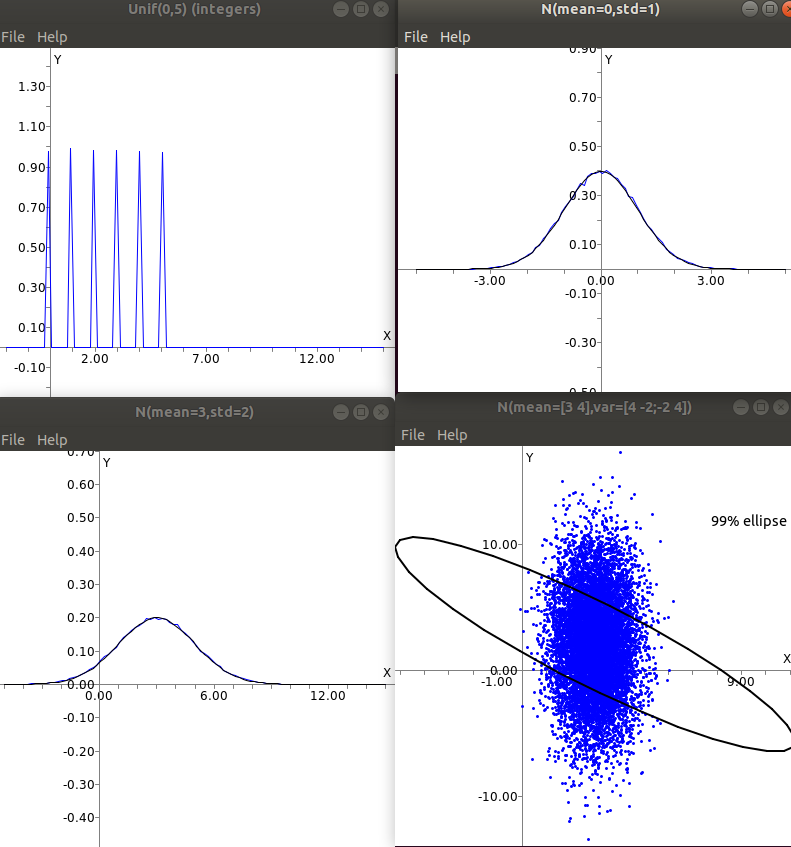Example: random_examples

C++ example source code:
/* +------------------------------------------------------------------------+ | Mobile Robot Programming Toolkit (MRPT) | | https://www.mrpt.org/ | | | | Copyright (c) 2005-2022, Individual contributors, see AUTHORS file | | See: https://www.mrpt.org/Authors - All rights reserved. | | Released under BSD License. See: https://www.mrpt.org/License | +------------------------------------------------------------------------+ */ #include <mrpt/gui.h> #include <mrpt/math/distributions.h> #include <mrpt/random.h> #include <iostream> using namespace mrpt; using namespace mrpt::gui; using namespace mrpt::math; using namespace mrpt::random; using namespace mrpt::system; using namespace std; // not run by default. Uncomment corresponding line in the main function. void TestHist() { CHistogram hist(0.0, 100.0, 10u); hist.add(86); hist.add(7); hist.add(45); cout << "Histogram test:" << endl; cout << "Should be 1: " << hist.getBinCount(0) << endl; // Result: "1" cout << "Should be 0.33: " << hist.getBinRatio(0) << endl; // Result: "0.33" } // ------------------------------------------------------ // TestRandomGenerators // ------------------------------------------------------ void TestRandomGenerators() { vector<double> x, y; getRandomGenerator().randomize(); // Uniform numbers integers: CDisplayWindowPlots win1("Unif(0,5) (integers)"); win1.setPos(10, 10); win1.resize(400, 400); { // CVectorDouble v1(100000); std::vector<size_t> v1(100000); getRandomGenerator().drawUniformVector(v1, 0, 5.999); CHistogram hist(-2, 15, 100); hist.add(v1); hist.getHistogramNormalized(x, y); win1.plot(x, y, "b"); win1.axis_fit(); } // Normalized Gauss: CDisplayWindowPlots win2("N(mean=0,std=1)"); win2.setPos(420, 10); win2.resize(400, 400); { CVectorDouble v1(100000); getRandomGenerator().drawGaussian1DVector(v1, 0, 1); CHistogram hist(-5, 5, 100); hist.add(v1); hist.getHistogramNormalized(x, y); win2.plot(x, y, "b"); CVectorDouble y_real(y.size()); for (CVectorDouble::Index k = 0; k < y_real.size(); k++) y_real[k] = mrpt::math::normalPDF(x[k], 0, 1); win2.plot(x, y_real, "k-", "real"); win2.axis_fit(); } // Example Gauss: CDisplayWindowPlots win3("N(mean=3,std=2)"); win3.setPos(10, 430); win3.resize(400, 400); { CVectorDouble v1(100000); getRandomGenerator().drawGaussian1DVector(v1, 3, 2); CHistogram hist(-5, 15, 100); hist.add(v1); hist.getHistogramNormalized(x, y); win3.plot(x, y, "b"); CVectorDouble y_real(y.size()); for (CVectorDouble::Index k = 0; k < y_real.size(); k++) y_real[k] = mrpt::math::normalPDF(x[k], 3, 2); win3.plot(x, y_real, "k-", "real"); win3.axis_fit(); } // Example multi-variate Gauss: CDisplayWindowPlots win4("N(mean=[3 4],var=[4 -2;-2 4])"); win4.setPos(420, 430); win4.resize(400, 400); { vector<CVectorDouble> v1; CVectorDouble Mean(2); Mean[0] = 3; Mean[1] = 2; CMatrixDouble22 cov; cov.fromMatlabStringFormat("[7.5 -7;-7 8]"); getRandomGenerator().drawGaussianMultivariateMany( v1, 10000, cov, &Mean); #if 0 CVectorDouble m; CMatrixDouble c; mrpt::math::meanAndCov(v1,m,c); cout << "Mean: " << m << endl; cout << "Std: " << endl << c << endl; #endif // pass to (x,y) vectors: CVectorDouble x(v1.size()), y(v1.size()); for (size_t i = 0; i < v1.size(); i++) { x[i] = v1[i][0]; y[i] = v1[i][1]; } win4.plot(x, y, "b.3"); win4.plotEllipse( Mean[0], Mean[1], cov, 3.0, "k-2", "99% ellipse", true); win4.axis_fit(); } mrpt::system::pause(); } // ------------------------------------------------------ // MAIN // ------------------------------------------------------ int main() { try { // TestHist(); TestRandomGenerators(); return 0; } catch (const std::exception& e) { std::cerr << "MRPT error: " << mrpt::exception_to_str(e) << std::endl; return -1; } catch (...) { printf("Untyped exception!!"); return -1; } }